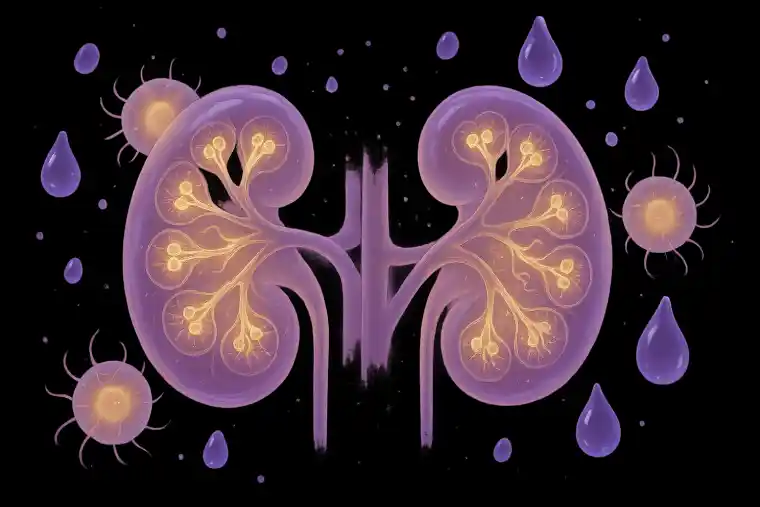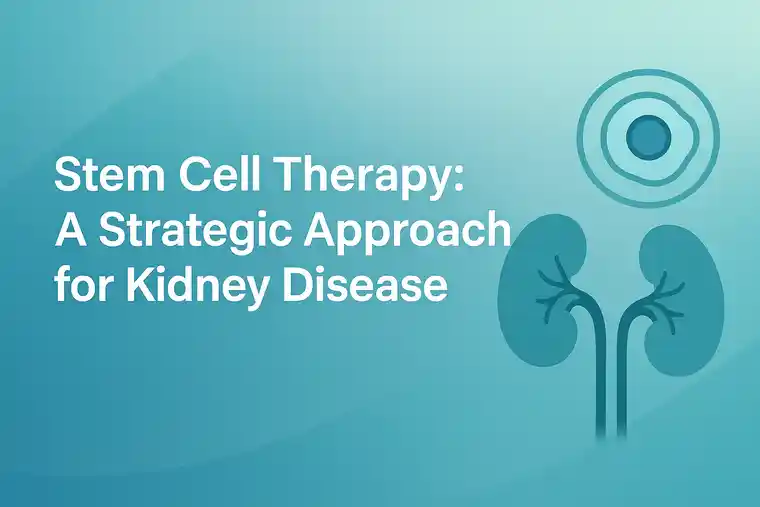By Dr. Deniz Kök
When the Kidneys Start Whispering
There’s a quiet kind of suffering that comes with kidney disease.
No sharp alarms, no sudden collapse — just a slow fade.
A little more swelling. A little less energy. Lab values inching in the wrong direction.
Until one day, dialysis is mentioned. And everything changes.
In my clinic, I’ve worked with patients at various points on this path — some recently diagnosed, others already counting down to the next stage.
Some were managing diabetes. Others were recovering from viral damage. A few had autoimmune conditions quietly gnawing away at their nephrons.
What they shared was a feeling of helplessness — as if all they could do was wait and hope not to get worse.
That’s not a position I accept lightly.
And that’s where stem cell therapy becomes part of the conversation — not as a miracle, but as a strategic, biological intervention with real potential to stabilize and support.
What Kidney Disease Actually Looks Like
Chronic kidney disease (CKD) doesn’t scream for attention. It sneaks up.
We classify it in five stages — stage 1 is mostly invisible. Stage 5 means dialysis or transplant.
Most people arrive in stage 3 or 4, without ever realizing what was happening.
Common causes include:
- Diabetes
- High blood pressure
- Autoimmune diseases such as lupus nephritis
- Polycystic kidney disease
- Glomerulonephritis
- Certain medications or toxins
Early symptoms are subtle:
- Swollen ankles or hands
- Persistent fatigue
- Loss of appetite
- Foamy urine
- High blood pressure
- Low hemoglobin levels
Conventional treatment focuses on slowing progression through medication, diet, and metabolic control. But for many, that only delays the inevitable.
What Stem Cells Can Offer the Kidneys
I’m often asked: “Can stem cells reverse kidney disease?”
Not exactly. But what they can do is change the biological environment — in a way that helps protect what remains.
Mesenchymal stem cells (MSCs) are being studied worldwide for their effects on kidney health. Here’s what they can do:
- Reduce inflammatory cytokines that damage kidney structures
- Inhibit fibrosis and protect nephrons from scarring
- Regulate immune overactivity in autoimmune conditions
- Improve microvascular circulation
- Release healing signals that support tissue stability
This doesn’t rebuild lost kidney tissue — but it can help slow down its destruction.
The Science We Trust
We’re not working on hunches. We’re working on published, peer-reviewed science.
- A 2019 study in Stem Cell Research & Therapy found that CKD patients receiving MSC infusions showed improvement in eGFR, creatinine, and proteinuria.
PubMed: 30841892 - In 2021, Kidney International Reports reported better glucose control and stable renal function in patients with diabetic nephropathy after MSC treatment.
PubMed: 33456964 - A 2022 review in Frontiers in Immunology showed MSCs protect podocytes, reduce basement membrane thickening, and modulate autoimmune pathways.
PubMed: 35432468
These findings give us a foundation for cautious optimism.
Who Might Benefit
Stem cell therapy may be a meaningful option for:
- Patients in CKD stages 2 through 4
- People with diabetic or hypertensive nephropathy
- Those with autoimmune kidney conditions like lupus nephritis
- Individuals with low but declining eGFR
- Post-COVID patients with renal inflammation
I generally do not recommend stem cell therapy for:
- Patients already on dialysis (stage 5 CKD)
- Individuals with active infections or cancer
- Patients with uncontrolled diabetes or severe hypertension
- Those receiving chemotherapy or heavy immunosuppression
Every case is reviewed individually and thoroughly.
How We Approach Treatment

Step 1: Kidney Health Assessment
We begin with a full nephrological evaluation, including:
- Kidney function tests (eGFR, creatinine, BUN)
- Urine analysis for protein and sediment
- Kidney ultrasound or elastography
- Autoimmune screening (if indicated)
- Metabolic panel including glucose, HbA1c, lipids, and blood pressure monitoring
Step 2: Personalized Regenerative Plan
Based on the patient profile, we may recommend:
- One to three intravenous MSC infusions
- Supportive IV treatments such as glutathione, NAC, B-vitamins, and zinc
- A renal-safe, anti-inflammatory nutrition plan
- Plant-based adaptogens like turmeric or astragalus, where appropriate
Step 3: Infusion Day
- Outpatient procedure, no hospital stay
- Lasts approximately 60 to 90 minutes
- No sedation required
- Short observation period afterward
Step 4: Follow-Up and Monitoring
- Monthly labs to track kidney function and protein levels
- Assessment of symptoms and overall wellbeing
- Adjustments to medications and nutrition as needed
- Option for booster therapy after 6 to 9 months, if clinically indicated
What Patients Have Shared With Me
“I was stage 3b and afraid of dialysis. After stem cell therapy, my eGFR held steady for the first time in two years. My doctor said, ‘Whatever you’re doing — keep doing it.’”
– Michael T., Germany
Many of my patients report:
- Slowed progression of kidney disease
- More stable lab values
- Less swelling and improved energy
- Better focus and appetite
- A greater sense of control over their health
Sometimes, even a pause in progression means everything.
Why Cell Source Matters
We only use stem cells sourced through the highest standards — from Stembio Cell Technologies in Istanbul. This lab is GMP-certified, Ministry of Health–approved, and committed to safety at every step.
Cells are ethically obtained from healthy umbilical cords with informed consent. Every batch is tested for pathogens including HIV, hepatitis B and C, CMV, EBV, and bacterial contamination.
The cells are cryopreserved at –196 °C and verified for identity and potency:
- Positive for MSC markers CD73, CD90, CD105
- Negative for blood cell markers CD34 and CD45
- Confirmed for multipotent capabilities through lab differentiation tests
Each batch is traceable from donor to recipient. Nothing is left to chance.
Final Thoughts
When kidneys begin to falter, the body loses its quiet guardians.
And too often, patients are told to wait — until dialysis is their only option.
Stem cell therapy offers a different path. One rooted in science, driven by biology, and guided by care.
It won’t work for everyone. But for some, it provides time — and time is precious.
Let’s protect what’s still working.
Let’s give your kidneys the cellular support they deserve.
References
- Liu Y. et al. (2019). “MSC infusion stabilizes renal function in CKD.” Stem Cell Res Ther.
PubMed: 30841892 - Park S. et al. (2021). “MSC therapy for diabetic nephropathy: a clinical update.” Kidney Int Rep.
PubMed: 33456964 - Zhang Y. et al. (2022). “MSC protection in lupus nephritis models.” Front Immunol.
PubMed: 35432468

